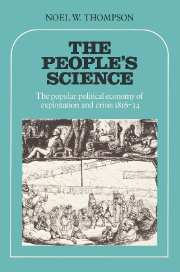Book contents
- Frontmatter
- Contents
- Preface
- Introduction
- 1 Changing attitudes to political economy in the working-class press 1816–34
- 2 The need for a working-class political economy
- 3 Charles Hall and Robert Owen: anti-capitalist and socialist political economy before the Ricardian socialists
- 4 Ricardian socialists/Smithian socialists: what's in a name?
- 5 The theory of labour exploitation and the working-class press 1816–30
- 6 The theory of labour exploitation and the working-class press 1830–34
- 7 Early socialist political economy and the theory of capitalist crisis
- 8 The popular political economy of crisis 1816-34
- Conclusion
- Bibliography
- Index
3 - Charles Hall and Robert Owen: anti-capitalist and socialist political economy before the Ricardian socialists
Published online by Cambridge University Press: 14 January 2010
- Frontmatter
- Contents
- Preface
- Introduction
- 1 Changing attitudes to political economy in the working-class press 1816–34
- 2 The need for a working-class political economy
- 3 Charles Hall and Robert Owen: anti-capitalist and socialist political economy before the Ricardian socialists
- 4 Ricardian socialists/Smithian socialists: what's in a name?
- 5 The theory of labour exploitation and the working-class press 1816–30
- 6 The theory of labour exploitation and the working-class press 1830–34
- 7 Early socialist political economy and the theory of capitalist crisis
- 8 The popular political economy of crisis 1816-34
- Conclusion
- Bibliography
- Index
Summary
If the sparse secondary literature on Hall indicates anything, it is that he is a writer whom it has proved singularly difficult to categorise. He has been variously described as an ‘agrarian radical’, a precursor of the so-called Ricardian socialists, a writer who anticipated the main lines of Ricardian socialist analysis twelve years before the publication of Ricardo's Principles, a ‘Pre-Marxian’, a writer who occupies an intermediary position in the history of socialism ‘between natural law or ethical socialism and proletarian or revolutionary socialism’ and someone who provided the ‘first interpretation of the voice of rising Labour’. If a consensus can be said to have emerged, however, it is that Hall occupies an intermediate position somewhere between agrarian radicals such as Spence, Ogilvie and Paine and the Ricardian socialists Hodgskin, Thompson, Bray and Gray. Certainly in terms of the structure of their works on the history of anti-capitalist and socialist economic thinking, that is where Hall is physically located by Beer, Cole and Alexander Gray.
Nevertheless, few writers have been prepared to discuss the specific nature of this intermediate position though it wou appear to rest upon the view that his critique of early industrial capitalism had some Ricardian socialist characteristics, while his positive suggestions as to how the impoverished state of the labouring classes might be alleviated were similar in important respects to those advanced by Ogilvie, Paine and Spence.
- Type
- Chapter
- Information
- The People's ScienceThe Popular Political Economy of Exploitation and Crisis 1816–34, pp. 65 - 81Publisher: Cambridge University PressPrint publication year: 1985



